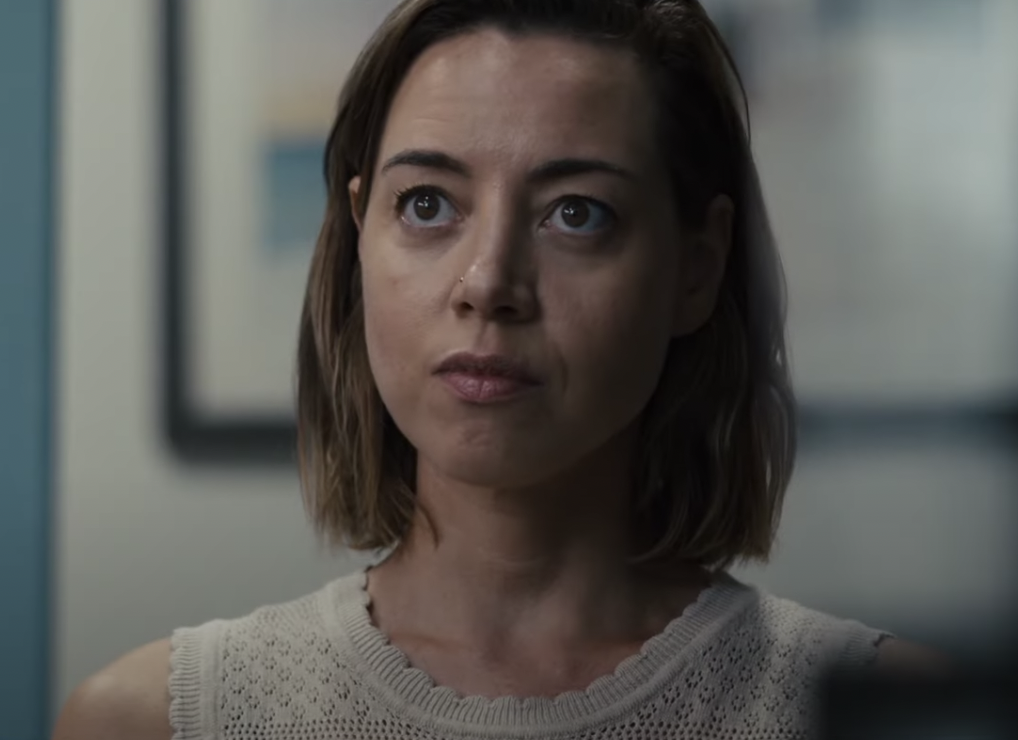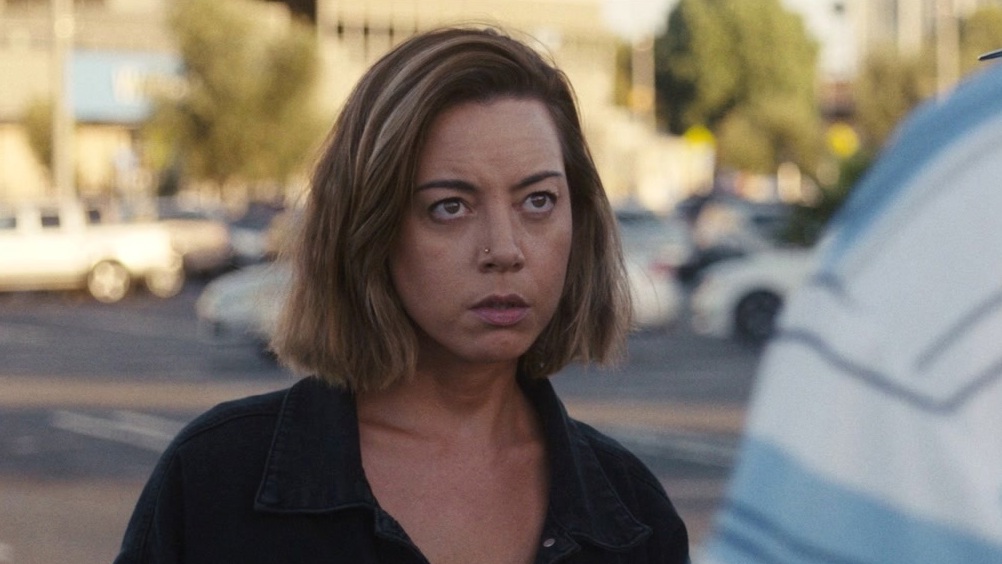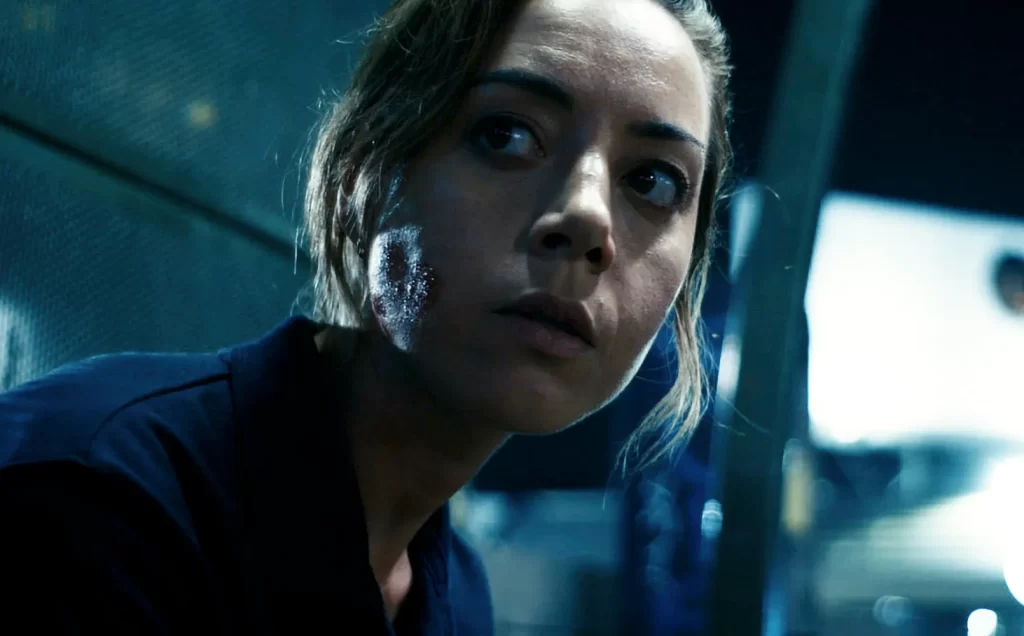
It’s just a flimsy piece of paper, but it carries the weight of an anvil—a scarlet letter printed in cold black and white. The man behind the desk utters two dreadful words—“background check”—and her face drains of color, her once-promising prospects vaporizing into smoke. “I just want you to be honest,” he says with a thin smile that masks a contemptuous sneer. But what he really wants is to dupe her, shame her, usher her into a confessional where he can play the role of supercilious priest. The interview was over before it started; it was over as soon as that banal printout found its way into his hands. Really, it was over years ago, when a courtroom stenographer typed the word “guilty”—a word that’s been invisibly hanging around her neck ever since.
This is a good deal of information to process, yet it’s all concisely packed into the brief opening scene of Emily the Criminal, which finds the title character (a riveting Aubrey Plaza) squirming at the end of a fishing line cast by a smug, purportedly upright middle manager (John Billingsley). Arguably, the film’s title alone, with its blunt two-word suffix, illustrates the hill its anti-heroine has been climbing most of her adult life. A long time ago, Emily did a bad thing. Now, that bad thing is all she is.
This description might suggest that Emily the Criminal, the feature debut of writer-director John Patton Ford, is a bracing political document—a scathing attack on a justice system in which a single offense warrants an existential life sentence at a virtual penal colony. And to be sure, the movie seethes with polemical anger. Much like the protagonist of Asghar Farhadi’s A Hero, Emily is burdened—one might say crippled—with a mounting debt that seems impossible to pay off. Specifically, she still owes $70,000 to the graphic design school that she attended in another life, leading to pitiful phone calls with bank officers where she learns that her recent $400 payment was applied entirely to interest, reducing the principal by precisely zero. Between her felony record and her balance sheet, Emily’s career prospects look less appetizing than the boxed lunches that she delivers while working double shifts for an anonymous catering company.

Doesn’t she deserve better? Maybe. But Emily the Criminal is no straightforward plea for prison reform or student-loan forgiveness. It is instead a dark odyssey of cracked hopes and desperate schemes, a vertiginous symphony whose instruments include tasers, box cutters, and zip ties. What begins as a spiky character study turns slowly, inevitably, into something far more dangerous and despairing.
This is a challenging feat, but Ford’s style smoothly reconciles the film’s intimacy with its ambition. He favors a loose, handheld approach, with the camera often following behind or hovering beside Emily as she strides through doorways and down sidewalks. This fluttery technique shouldn’t be mistaken as casual or sloppy; instead, it brings us nearer to the character, drawing us inside her orbit so that we can perceive the blizzard of thoughts racing through her brain. As the movie’s gravity intensifies—as Emily finds herself under increasingly suffocating pressure—the pacing and editing quicken, yet Ford never relinquishes that sense of closeness. The result is something like a Michael Mann picture by way of the Dardenne Brothers.
Emily the Criminal is structured as a perpetual descent—a downward spiral of bad choices, bad intentions, and bad luck. The plunge begins when an upbeat coworker gives Emily a phone number that, once texted, spits out an address, along with an irresistible leading question: “Do you want to make $200 in an hour?” The next day, after she wanders into an undistinguished warehouse appointed with cheap metal folding chairs and suspiciously expensive-looking equipment, she discovers that she’s being recruited to participate in a credit-card fraud scheme. The attractive salesman who pitches her, Youcef (Theo Rossi, best known to me from Luke Cage), is charming but also candid, informing a crowd of anxious novices that although their actions won’t harm anyone, he’s nevertheless asking them to do something illegal. Swallowing her scruples (and perhaps remembering her loan balance), Emily strolls into an electronics store armed with a fake ID and an elevated heart rate; a few minutes later, she walks out with a flat-screen TV, a slightly fatter wallet, and some pep in her step. Perhaps she’d like to do another job tomorrow, one that is, in Youcef’s words, “a little bit more complicated”?

You might think you know where this is going, and to an extent, you do. Bedazzled by the promise of easy cash, and aggravated by the mundane cruelties of her legitimate work—when she objects to losing shifts, her boss at the catering shop reminds her that she’s an independent contractor and smirks, “Call your union rep”—Emily wades deeper into the grift, at which point the risks to her well-being grow correspondingly graver, shifting from financial to legal to mortal. It wouldn’t be quite right to call Emily the Criminal an action movie, but Ford still supplies a number of set pieces involving Emily’s illicit trade—scamming businessmen out of a luxury car as a clock ticks perilously down; negotiating with buyers who are unbound by the social contract; turning the tables on a client who attempts to overpower her with sheer force—that throb with uncertainty and suspense. The film’s overall downward trajectory is inexorable, but its specific steps are nonetheless unpredictable.
Yet even more intriguing than what happens is why it happens—or, rather, who is to blame for it happening. Youcef, it would seem, is the devil on Emily’s shoulder, a Faustian agent of darkness who seduces her with whispers of personal luxury and professional independence. He teaches her how to operate the counterfeiting machinery, supplies her with weaponry, and instructs her in the finer points of the con game (e.g., never swindle the same store twice in one week). If only Emily hadn’t met him, she’d still be on the straight and narrow.
But what if that’s wrong? What if Youcef’s emergence simply catalyzes a predatory gene in Emily’s makeup that has been lying dormant all along, waiting to be activated? What if that appellation in the film’s title is less a sad commentary on penal disenfranchisement than an accurate assessment of her character? What if she’s just a bad seed?

These questions form the true thematic heart of Emily the Criminal, and their essential unknowability speaks to the genius of Plaza’s performance. It’s been five years since the actor rocked Sundance with her electrifying turn in Ingrid Goes West, and while she’s worked steadily since then (I haven’t seen the much-admired Black Bear), she’s yet to receive the acclaim she deserves. This should change that. Flashing a dirty-blond dye job and a clipped Jersey accent, Plaza shaves down her characteristic glower, replacing it with a sharper, more volatile impatience. Emily is smarter than most people in her orbit, and the simmering anger that periodically bubbles to the surface of her complexion reflects the frustration she feels toward a world that refuses to recognize her intelligence and autonomy. This wounded pride can be the mindset of both a victim and an abuser, and as the movie gathers momentum—as Plaza systematically peels off layers of politeness and caution, replacing them with determination and fury—it becomes difficult to tell whether Emily is one or the other.
It might depend on whom you ask. Alongside Emily’s lawbreaking exploits, Ford’s screenplay builds a parallel plot involving her efforts to leverage her gifts as a painter. At first, this juxtaposition appears to be overly convenient—a theoretical snapshot of a fulfilling, above-board career that contrasts obviously against her down-and-dirty thievery. But the movie collapses the distinction, blurring Emily’s motives and complicating her choices. In a late scene, thanks to the labors of a college friend (Megalyn Echikunwoke), Emily lands an interview with a high-powered executive (Gina Gershon) at a sleek-looking design firm; the ensuing verbal confrontation between the two women—revolving around the possibility of a “full-time internship,” a prospect Emily deems obscene—is as charged and dyspeptic as any of the violent encounters she shares with bloodthirsty lowlifes.
Is Emily’s venomous reaction one of justifiable outrage or self-serving rationalization? Ford and Plaza aren’t telling, and the brilliance of Emily the Criminal is that it neither indicts Emily nor exonerates her. Or maybe it does both. After all, she is a bundle of contradictions: worldly and naïve, humiliated and proud, sympathetic and scary, but above all—what was the title again?—innocent and guilty.
Grade: A-
Jeremy Beck is the editor-in-chief of MovieManifesto. He watches more movies and television than he probably should.

This film slayed – tight, super intense, and ultimately ambiguous. Plaza was phenomenal. Probably the movie that’s actually stayed with me the most since I watched it in all of 2022.
I randomly find myself muttering, “We’re serious people, he should be scared of us.” Probably nothing to worry about.